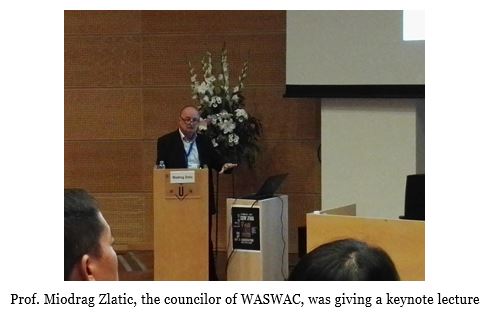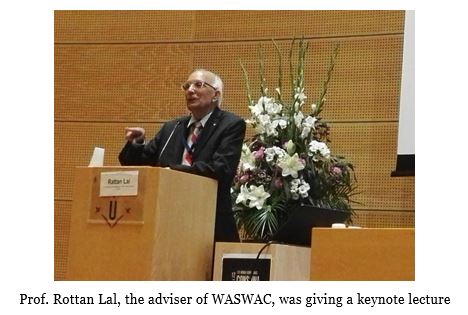The keynote lectures were a very important part of the Conference, with lecturers purposely selected, based on their recognized experience, research and responsibilities, at World or regional levels, in the central topics of CONSOWA. They included:
1. RATTAN LAL(USA) "Soil and Water Conservation to Mitigate Climate Change and Advance Food and Nutritional Security".
2. ZHAOYIN WANG (CHINA) "Two thousand years debate and practices of sedimentation management of the Yellow River".
3. WINFRIED BLUM (AUSTRIA) "Threats to soil and water conservation - general developments and future scenarios, a worldwide perspective".
4. WALTER PENGUE (ARGENTINA) "Mining Soils in the Argentinian Pampas: Hiden costs derived of technological intensification in industrial agricultural models"
5. JOSÉ LUIS RUBIO (SPAIN) "New perspectives for soil conservation in today global transition scenarios".
6. FERNANDO DELGADO (VENEZUELA) "Soil-water-climate management and conservation systems in ancient cultures of Tropical Latin America".
7. GUSTAVO MERTEN (BRASIL) "Soybean expansion in Brazil: land use changes and soil management challenges".
8. MIODRAG ZLATIC (SERBIA) "Socio - economic issues of torrential flooding prevention".
9. SAMIR A. EL SWAIFY (USA) "Diagnostic Criteria for Soil Degradation-Necessary Distinctions for Tropical Environments".
10. LI RUI (CHINA) "Preliminary Functions of Soil and Water Conservation Practices for Climate Change Mitigation and Adaptation in China".
11. MIQUEL ARAN (SPAIN) "Role of inorganic and organic fertilizers on soil degradation. Case of the intensive arable land in Western Catalonia (Spain)".
12. MARK NEARING (USA) "The Rangeland Hydrology and Erosion Model".
13. CARMELO DAZZI (ITALY) "Anthropogenic soils and soil security: environmental and economic consideration".
14. ARTEMI CERDÁ (SPAIN) "Fire effects on soils and on erosion processes".
15. FENLI ZHENG (CHINA) "Soil erosion, soil quality and crop yield in the Chinese Mollisol region".
16. ROY SIDLE (AUSTRALIA) "Dynamic environmental controls on rainfall triggered landslides".
17. ILDEFONSO PLA (SPAIN) "New advances in the evaluation of salt-affected soils under dryland and irrigated conditions".
18. WANG FEI (CHINA) "Impacts of re-vegetation on surface soil moisture over the Chinese Loess Plateau and new challenges of soil and water conservation".
19. BERND LENNARTZ (ALEMANIA) "Nutrient export patterns from artificially drained lowland catchments"

Their presentations covered, and even surpassed our expectations, and from them, and the discussion generated, we may extract the following conclusions:
Most of the present and previewed at medium term problems derived of soil and water degradation and their effects, at Worldwide level, may be mainly attributed to pressures derived population growth and development, and to social, economic and marketing factors

Nowadays, besides surface erosion processes, are other soil degradation processes like mass erosion, soil organic matter and nutrient depletion, soil and water contamination and salinization, soil compaction, etc., which in many cases have more direct influence on critical derived effects related to food and water supply for an increasing population, and to natural disasters like droughts, sedimentation, flooding, etc., causing increasing human and economic losses
The adoption of what usually are considered "standard", of universal application, land conservation systems and practices, like bench terracing, cero tillage, etc., without considering the specific conditions (soil, climate, drainage, crops, rotations, etc.) may lead, and is leading instead to land, soil and water degradation processes, with onsite and offsite sometimes catastrophic consequences. There were presented examples of those processes in China, Argentina and Brazil, with different characteristics, but in all cases affecting very large extensions of agricultural lands
The benefits of soils, as regulator of greenhouses gas emissions to the atmosphere, through C sequestration in the soil, may be better reached in a sustainable way, with appropriate land, soil and water management leading to improved sustainable agricultural production, and to reduced deforestation, The approach has to be more to apply land management practices to attenuate climate change progress and effects, than to adapt land management practices to mostly hypothetical previewed future climate changes

Although land and soil degradation processes and related effects are generally a consequence of inadequate land use and management, derived of social and economical pressures, their effective control is in many cases limited due to deficiencies in the available local information on soils, climate, and on research related to the specific degradation processes. In those cases, the empirical application of "standard" or "universal" conservation practices, supposedly effective under any combination of soils, climate, hydrological conditions, cropping systems, etc., may lead and is leading to catastrophic consequences
The great number of factors, and their complex interactions, determining and affecting soil and water degradation processes, and conservation practices, require more interdisciplinary approaches and research, in order to be able to identify, to evaluate and to find adequate valid and sustainable alternatives to the different problems

